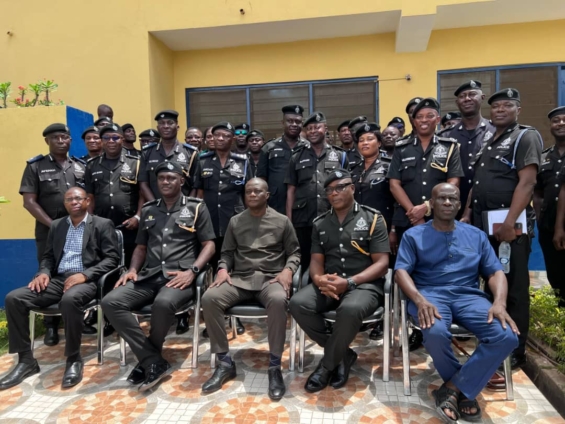
Audio By Carbonatix
The number of robbery cases recorded in 2024 within the operational zone of the Western Region was thirteen. The Police command in the region says this is a significant reduction as against the previous years.
According to the Western Regional Police Commander Deputy Commissioner of Police, (DCOP) Osei Akoto, the command is committed to change the narrative in terms of prevention and management of crime within the jurisdiction.
He said they're committed to maintaining law and order, protecting lives and property, while preventing and detecting crime, as well as ensuring public safety.

Briefing the Chairman of the Regional Security Council (REGSEC) and Western Regional Minister Hon. Joseph Nelson, on performance of the command and its architecture, he assured the Minister that with a focus on police community engagement, proactive policing, and effective collaboration with other security agencies, the command would surely improve service delivery and quality of security in the region.
The Western Region, according to the commander, is divided into Western and Western Central Police Regions for operational purposes, with 5 divisions, 11 districts, and 38 police stations dotted across the specific zonal areas.

DCOP Osei Akoto highlighted the command's successes, including a significant reduction in violent crimes, with only 13 robbery cases recorded in 2024.
All these achievements notwithstanding, he confirmed that challenges confronting their operations still persist, including the threat of environmental degradation from illegal miners (galamsey activities) chieftaincy disputes, and road traffic offences.
In response, the Western Regional Minister, Hon. Joseph Nelson, emphasised the need for a collaborative approach to addressing these challenges, particularly galamsey, which affects the entire nation.
He condemned environmental degradation and its threat to national security. In the region, the number of chieftaincy disputes, the Minister observed is alarming. The minister said the police, government, and community stakeholders must work together to address these challenges.

The Minister noted that his administration would support the police to continue to employ community-based policing strategies to ensure proactive patrols.
He explained the essence of regular engagement between police and community leaders, with support from the Regional Coordinating Council and other stakeholders.
Latest Stories
-
Vudumane out with latest single ‘Love No Dey’
55 minutes -
Health advocates call for nationwide HPV Vaccination for boys
60 minutes -
Pope Leo to tour four African countries in first major overseas trip of 2026
1 hour -
Full text: Finance Minister presents Ghana Accelerated National Reserve Accumulation Policy
1 hour -
Rev Opuni-Frimpong calls for national dialogue on rising SHS indiscipline
1 hour -
Kumasi prodigy wins National Spelling Bee with ‘breviloquent’
2 hours -
Gov’t to purchase 3 tonnes of gold weekly in push for 15-month import cover – Ato Forson
2 hours -
The psychology behind scams: Why smart people get tricked
2 hours -
Clean Energy Chamber calls for lower import duties on EVs and components for local assembly
2 hours -
Communications Minister launches committee to safeguard sustainability of DTT platform
2 hours -
Cambridge conference spotlights future-ready education in Africa
2 hours -
Sam George calls for trust-driven, inclusive banking at Connected Banking Summit
2 hours -
Ghana targets 15-month import buffer with GANRAP
2 hours -
Ghana’s democracy is speaking; Are we listening?
2 hours -
Government targets 127 tonnes of small-scale gold yearly under new reserves policy
2 hours

